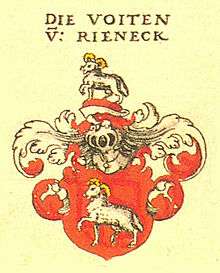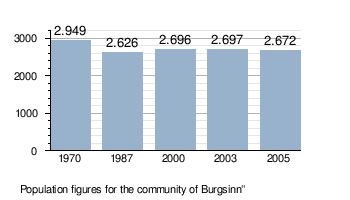Burgsinn
| Burgsinn | ||
|---|---|---|
| ||
 Burgsinn | ||
Location of Burgsinn within Main-Spessart district  | ||
| Coordinates: 50°09′N 09°39′E / 50.150°N 9.650°ECoordinates: 50°09′N 09°39′E / 50.150°N 9.650°E | ||
| Country | Germany | |
| State | Bavaria | |
| Admin. region | Unterfranken | |
| District | Main-Spessart | |
| Municipal assoc. | Burgsinn | |
| Government | ||
| • Mayor | Franz Schüßler (CSU) | |
| Area | ||
| • Total | 51.38 km2 (19.84 sq mi) | |
| Population (2013-12-31)[1] | ||
| • Total | 2,503 | |
| • Density | 49/km2 (130/sq mi) | |
| Time zone | CET/CEST (UTC+1/+2) | |
| Postal codes | 97775 | |
| Dialling codes | 09356 | |
| Vehicle registration | MSP | |
| Website |
www | |
Burgsinn is a market community in the Main-Spessart district in the Regierungsbezirk of Lower Franconia (Unterfranken) in Bavaria, Germany and the seat of the Verwaltungsgemeinschaft (Administrative Community) of Burgsinn.
Geography
Burgsinn lies in the Main-Spessart Region.
The community has only the Gemarkung (traditional rural cadastral area) of Burgsinn.
History
A stone hatchet found in Burgsinn, from the dying days of the Münchshöfen Culture (Neolithic, about 2000 BC), bears witness to the first known human presence in the municipal area. In 812 a document from the Fulda Abbey mentioned the Sinngau (“Sinn District”), or in the spelling of the time, Sinnahgeuue. From the year 1001 comes the first written proof of the community’s existence; at that time it was the village of Sinna, a Würzburg holding. In 1303 a source speaks of Burgmannen of Gotzo, Aplo et Her (mannus) de Sinne occupying the Sinna border fortifications. In 1334, Emperor Louis the Bavarian granted dem Dorf zu Synne (“The Village at Synne”) “everlasting” market rights. In 1338, Dietz von Thüngen became hereditary Burgmann and Lord of the castle and locality of Sinna. Dietz von Thüngen’s son Wilhelm acquired the Burgsinn lordship, with all appurtenances, in 1405 for 10,000 Gulden
The former knightly estate of the Barons of Thüngen was mediatized by Prince Primate von Dalberg’s Principality of Aschaffenburg. In 1808, it was traded to the Grand Duchy of Würzburg, with which it passed to Bavaria in 1814.
Coat of arms

The community’s arms might be described thus: Or a ram’s attire gules.
The ram’s horn can have been taken from neither the arms borne by the Barons of Thüngen nor those borne by the Counts of Rieneck, even though both families are tightly bound with Burgsinn’s history. While the half of Castle Burgsinn that the Counts of Rieneck held in fief passed, when the Counts’ Rothenfels line died out, back to Würzburg in 1333, with the Barons of Thüngen buying the whole castle in 1405 from Würzburg, it was the Voit von Rieneck family, long the Vögte at Rieneck, who were until the 15th century holders of part of the tithes and of the court at Mittelsinn.
In 1630, when the Electorate of Mainz moved to strip the family Thüngen of their fief, the court at Burgsinn was held by the von Rieneck family’s steward. The Counts of Rieneck had already died out in the early 16th century. After the Thüngens were reinstated in Burgsinn in 1697, besides various other agreements made by the community, the community received an explicit assurance that it could use “its old village seal”. What kind of seal this was and from what time it came is not said, but since the Voit von Rieneck family bore a ram in its coat of arms, it can be assumed with a likelihood bordering on certainty that Burgsinn’s coat of arms was a reduced version of the Voit von Rieneck family’s.
Population development

Politics
The mayor is Franz Schüßler.
Municipal taxes in 1999 amounted to €1,065,000 (converted), of which net business taxes amounted to €155,000.
Economy and infrastructure
According to official statistics, there were 5 workers on the social welfare contribution rolls working in agriculture and forestry in 1998. In producing businesses this was 193, and in trade and transport 140. In other areas, 136 workers on the social welfare contribution rolls were employed, and 878 such workers worked from home. There were 3 processing businesses. Three businesses were in construction, and furthermore, in 1999, there were 24 agricultural operations with a working area of 371 ha, of which 29 ha was cropland and 325 ha was meadowland.
Transport
Burgsinn lies on the Hanover-Würzburg high-speed rail line and the Flieden–Gemünden railway line. At the Betriebsbahnhof Burgsinn (depot), trains can be switched between the old and new lines.
Culture and sightseeing
Buildings
- The Old Castle
-
Entrance to the castle park
-
The complex
-
The moat
-
Beside the castle
-

West side
- The castle (Burg in German, meaning a mediaeval military fortification), also called altes Schloss (a word meaning “palatial castle” or “château”) is laid out like a typical moated castle with a tower at each of the four corners. At the way into the castle stands an imposing 22 m-tall keep with each side 8.5 m in length[2] and the walls are 2.6 m thick. The time of the tower’s building has been dated to the 12th century. The buildings that are still standing were converted or renovated in the 16th or 17th century.
Medicine
Medical services are provided by three general practitioners with surgeries in the community, one dentist, a pharmacist, two phyiotherapists and the four hospitals, each just under 30 km away, in Lohr, Karlstadt, Schlüchtern and Bad Brückenau. Furthermore, there is a Bavarian Red Cross rescue station in Burgsinn equipped with an ambulance. The station is manned round the clock, seven days a week.
Education
As of 1999 the following institutions existed in Burgsinn:
- Kindergarten: 100 places with 103 children
- Primary school-Hauptschule with 23 teachers and 359 students (as of 2007/2008 school year)
Eating out in Burgsinn
In Burgsinn is found a lively culinary scene in which 14 restaurants, cafés, pubs and so forth are available for diners to choose. Among these places are an ice cream parlour, two snackbar-pubs, one döner snackbar-restaurant, an Italian restaurant, two other restaurants with German cake, a bistro, two cafés and several pubs.
This also makes Mittelsinn an alternative for people from neighbouring communities such as Rieneck, Fellen, Aura, Obersinn and Mittelsinn when they want to go out without having to go all the way to Karlstadt, Lohr, Brückenau, Würzburg, Fulda or Aschaffenburg. During the week, as well as at weekends, pubs have been opening for long hours and offer something for (almost) every taste.
Shopping in Burgsinn
There are several butcher’s shops and bakeries in Burgsinn, and further shops of all kinds, among them an interior decorator’s, a small do-it-yourselfer’s market, a travel agency, a ladies’ and men’s fashion shop, one boutique each for children’s and youth’s wear and for ladies’ wear, two office supply and stationery shops, a hobby shop, a watchmaker’s and an optician’s, along with others. There are also three big supermarkets: a Diska-Markt in the middle of the community, and on the edge of the community core a tegut… and a Penny-Markt.
Leisure
Burgsinn has at its disposal a relatively big outdoor swimming pool with a 50 m-long basin which includes a diving tower area (1, 2 and 3 m), a basin for non-swimmers with a slide and a wading pool. The complex also has a beach volleyball court.
There is also a park complex in the community and the cycle paths around Burgsinn run from Würzburg all the way to Fulda.
References
| Wikimedia Commons has media related to Burgsinn. |
|
